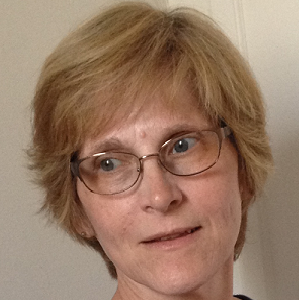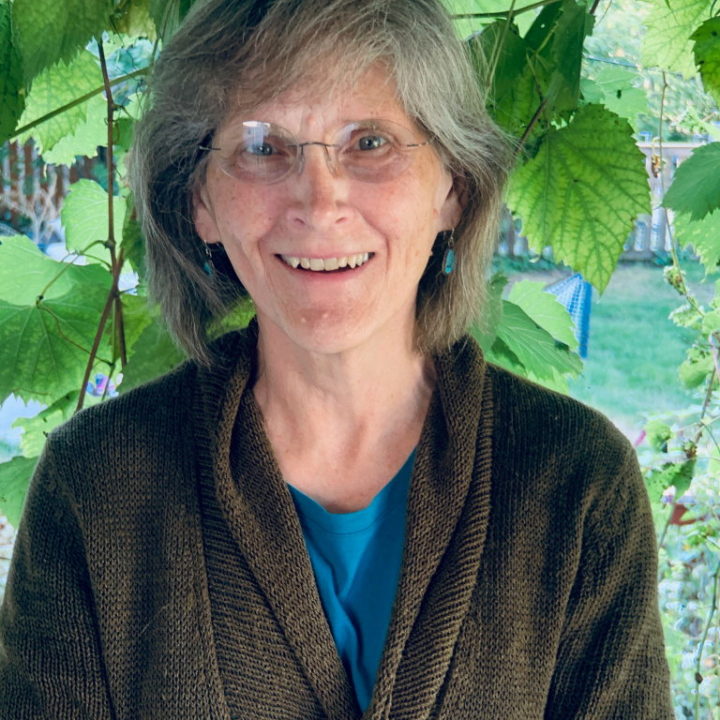NOTE: Images in this archived article have been removed.
In Resilience Reflections we ask some of our contributors what it is that inspires their work, and what keeps them going.
Read more Resilience Reflections here including Sandra Postel and Robert Jensen.

Adrian Ayres Fisher works as a sustainability coordinator for a community college. She also writes and gives talks about sustainability and reconciliation ecology from a Midwestern point of view. Her home is in an inner-ring suburb of Chicago and she blogs at Ecological Gardening.
Adrian writes that the questions have been answered in between helping organizing and taking part in Earth Month activities, doing spring cleanup in my garden, starting seeds, forest preserve work. The photo was taken in late spring last year when she visited Bluff Spring Fen (Illinois), a former gravel quarry and dumping site now restored and maintained by volunteers.
Who/what has been your greatest inspiration? And why?
This is a very difficult question because there is no one person, place or situation. The lives and/or works I find most inspiring share certain values and traits—originality and independence of thought, beauty of expression, fineness of work, authenticity, concern with ethics, with how we treat one another and other species, love of nature. And humor, of course.
The general questions are how, as a deeply flawed human, one should live one’s life; how one should conduct oneself in relation to people and other species; how one can best do the work to which one is called; how to deal with adversity; how to take courage. People whose lives and work show that they have grappled with these questions in meaningful fashion and have achieved or created something worthwhile beyond the requirements of daily life are a great inspiration to me. When I say worthwhile, I don’t only mean people and works of genius, either. So many people are doing and achieving so much, in so many ways.
And then, much inspiration comes through books—non-fiction and fiction, poetry and myths. The list is extremely long.
Knowing what you know now about sustainability and resilience building, what piece of advice would you give your younger self if you were starting out?
“Learn more systems thinking and ecology sooner, learn your home ecosystem better sooner, and don’t wait so long to start growing vegetables.”
Learn more systems thinking and ecology sooner, learn your home ecosystem better sooner, and don’t wait so long to start growing vegetables.
What keeps you awake at night?
Of course there are the usual family or work issues, or deadline anxieties. Underneath used to be a drumbeat of anger, frustration, fear, and despair about the general ongoing environmental catastrophe over which our species is presiding, including climate change, and the consequent civilizational collapse. As long as I feel that I’m doing some small thing to help, I can sleep ok.
What gets you up in the morning or keeps you going?
Love and creative desire, which fuel the will and effort needed to work. Aggravation. Going outside to see what’s growing. People I love. A sense of duty and responsibility. As a sustainability professional, stewardship volunteer in the forest preserves, and home gardener, I am fortunate to do purposeful work.
What has been your biggest setback and how did you recover?
My biggest setback as an adult was in the early 2000’s. I had prepared for a certain career and during the training had something of an emotional and physical collapse due partly to my unsuitability for the profession and partly to my increasing awareness of environmental problems. The result was a profound spiritual crisis. My husband, children and I had always lived a pretty sustainable lifestyle, but I came to understand that the only way forward out of despair was to live an earth centered life and focus on directly related, helpful work. I’m a Quaker, and we have a long tradition of living according to our leadings, so I got and continue to get a great deal of support from my spiritual community. Relationships with family and a number of good friends are enlivening. My husband acts as the steady-on basso continuo while I flounder about.
For you resilience is…?
Having enough good health, flexibility and strength (and redundancy) to thrive as part of a dynamical system and to recover after disturbance—whether speaking of a plant species, a person, an ecosystem, or a society. Of course it also includes good adjustment to natural boundaries and conditions. Resilience is an interesting term to apply to the project in which so many of us are engaged, no matter how small a part we play, which is trying to figure out how to readapt human society, economy and technology to the natural boundaries of the biosphere.
What one social/political/cultural/policy change would most assist your work/hopes/dreams?
The single biggest change would be giving nature “standing” and incorporating the rights of nature into our cultural framework—spiritually and morally as well as legally and practically. Reciprocity would become a guiding value. Humans do belong here as part of the Earth community but we’ve forgotten, if we ever completely understood, that nature, that living ecosystems and other species have intrinsic value, have the right to exist in and of themselves. One hopes humans would learn to respect this and practice both greater restraint and greater nurturance; to do otherwise is suicidal.
A corollary to this would be learning to live within ecosystem limits and to work with nature for our livelihoods. Agriculture would change. No more mountaintop removal. Humans might be more careful about the plastic we make, use and discard, the toxic chemicals we invent and use, how we manufacture things, our emissions. I’m not sure a lot of people understand how completely we are of our ecosystems.
“What gives me hope is meeting and reading or hearing about all the people all over the world from so many cultures who are working in so many ways to help ecosystems recover…”
What gives you hope?
What gives me hope is meeting and reading or hearing about all the people all over the world from so many cultures who are working in so many ways to help ecosystems recover, to discover and implement new/old, low carbon ways of life, to help make cities sustainable, to engage in regenerative farming and ranching, work for social justice and peace—the list goes on and on. But also things like sitting under a gnarled old bur oak and watching a tiny warbler 40 or 50 feet up that has stopped off during its spring journey from South America to the boreal forests of Canada. Or seeing the first bumblebee queens looking for nesting places or coming across the first spring beauties and bloodroot. Or, spring and fall, seeing sandhill cranes migrating, remembering they were once nearly extinct and how, thanks to human efforts, their numbers have rebounded and continue to do.
What book/film/other resource has most supported your work?
Again, this is a difficult question. I’ve been fortunate in my mentors—ecologists, naturalists, and stewards—from whom I’ve learned a great deal. Some of the old Quaker writers give me backbone. I absorbed Aldo Leopold’s philosophy before I was old enough to understand what philosophy is.
Discovering the Oil Drum and Energy Bulletin years ago was a huge influence. I started reading people like Richard Heinberg, John Michael Greer and Sharon Astyk and doing more research on collapse, peak oil, overshoot, limits to growth and so on. This helped me develop a new intellectual framework from which to view our society, and I formed the ambition of somehow getting in on the conversation, of making a contribution. Much of what I do flows from that.







